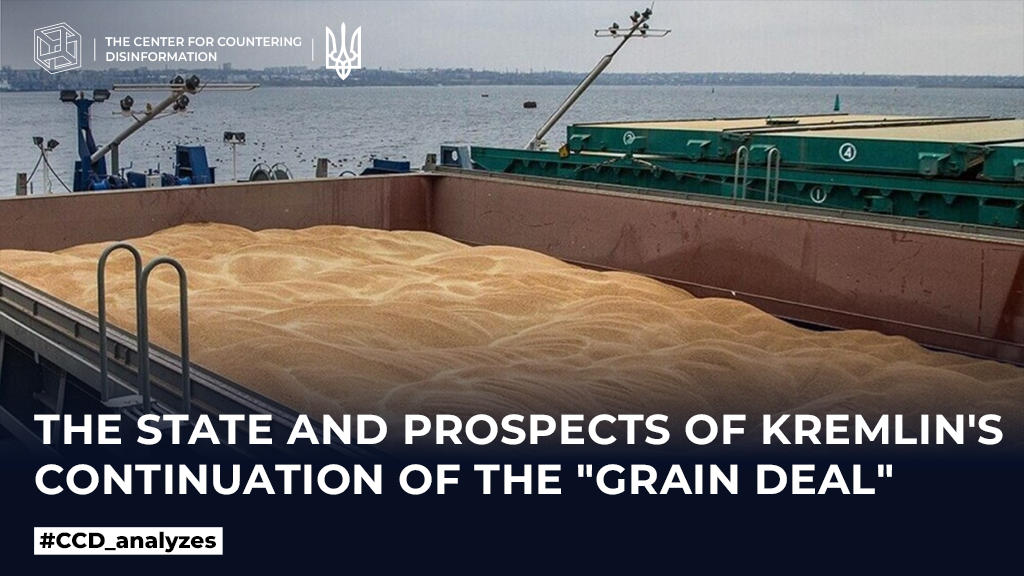As you know, on July 17, 2023, moscow withdrew from the Black Sea Grain Initiative, an agreement between the UN, Turkey, russia and Ukraine on sea corridors for the export of grain and related products from Ukraine.
The kremlin has threatened to sink every ship heading to Ukrainian ports. Fortunately, so far this has not happened, and on August 26, the second Liberian-flagged Primus vessel, which had been in Ukraine since February 20, 2022, left the waters of the Odesa port without hindrance.
Why does russia need this? It is obvious that putin has found a replacement for gas as a geopolitical weapon. On the one hand, the kremlin uses “grain blackmail” as a lever to influence the position of the collective West on Ukraine, and on the other hand, it seeks to oust Ukraine from the grain market and legitimize the export of grain stolen from the temporarily occupied territories of Ukraine. By cynically offering free grain to African countries, russia will threaten their populations with famine if they deviate from the pro-russian position.
What is preventing Ukraine from safely exporting grain through the Black Sea?
First, the export of Ukrainian grain has caused tensions between Ukraine and its neighboring countries. 5 EU countries – Poland, Bulgaria, Hungary, Romania, and Slovakia – support the extension of the ban on Ukrainian grain imports until the end of the year under the pretext that they are facing an oversupply of Ukrainian products on their markets and massive protests by local farmers. Ukraine’s Foreign Ministry declared this decision categorically unacceptable, as it “does not comply with the spirit and letter of the EU-Ukraine Association Agreement.” Later, the European Commission was able to reach a compromise with Poland, Hungary, Slovakia, Romania, and Bulgaria that they could ban the sale of Ukrainian agricultural products on their territory, but would not impede transit to other countries. However, there is still no written decision of the European Commission regarding the European countries that have stopped imports of Ukrainian grain. Moreover, Poland is likely to refuse to comply with the EC’s decision and will continue to ban the export of Ukrainian agricultural products until the end of 2023. The decision of the Polish authorities has political reasons in the context of the upcoming parliamentary elections in the country on October 15, the outcome of which largely depends on the support of the ruling party by agricultural farmers.
Second, negotiations between the Ukrainian government and international insurance companies on the insurance of grain ships traveling to and from Black Sea ports need to be finalized. Currently, the agreement is being worked out between Ukrainian state-owned banks and international insurance groups, including Lloyd’s of London, and is expected to be concluded as early as next month.
Thirdly, according to Western media, to replace the Black Sea Grain Initiative, russia, together with Turkey and Qatar, is secretly preparing a new scheme for grain exports to poor countries, particularly to Africa, without Ukraine’s participation. According to the new scheme, such supplies would be made under the auspices of the UN World Food Program and financed by Qatar. This is what Turkish President R. Erdogan is supposed to discuss during his meeting with putin on September 8. It is possible that putin will use this narrative to extend the “grain” deal on the kremlin’s terms.
What is the way out of the situation?
Of course, Ukraine and the West are interested in restoring the Black Sea Grain Initiative. At the same time, in order not to become a hostage to russian blackmail, Ukraine, with the support of the EU, is actively considering alternative ways to export agricultural products without russian involvement. For example, the EU offers Ukraine so-called solidarity belts for the export of grain and other products from Ukraine. At the diplomatic level, an agreement was reached on the transportation of Ukrainian grain through Croatian ports on the Danube and in the Adriatic Sea, Romanian ports on the Danube (at the level of 4 million tons per month) and by trains of the Latvian state railway company (from 500 thousand to 1 million tons). Experts estimate that the tonnage transported via alternative routes actually exceeded the volumes transported under the grain deal. Therefore, about 45 million tons of Ukrainian grain, oilseeds and related products, as well as more than 36 million tons of non-agricultural products, including iron ore, steel, land and timber, were exported via alternative routes through Poland and Romania, bringing about 33 billion euros to Ukrainian farmers and businesses.
There is no doubt that russia will continue to create artificial obstacles for Ukraine’s navigation in the Black Sea. No wonder, in order to prevent Ukraine from exporting grain by sea, the russians began to attack the port and grain infrastructure of Odesa region. Therefore, the main task of Ukrainian and Western diplomats remains to return the Black Sea to the status of an external jurisdiction where commercial shipping is absolutely safe and does not depend on the kremlin’s ambitions.










